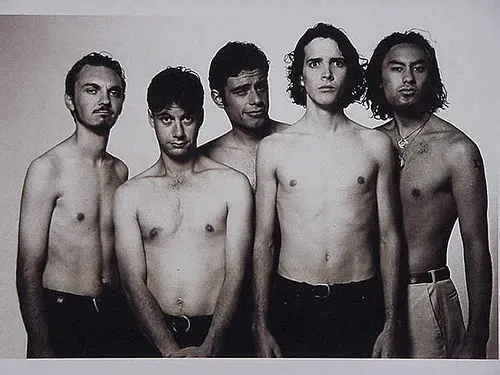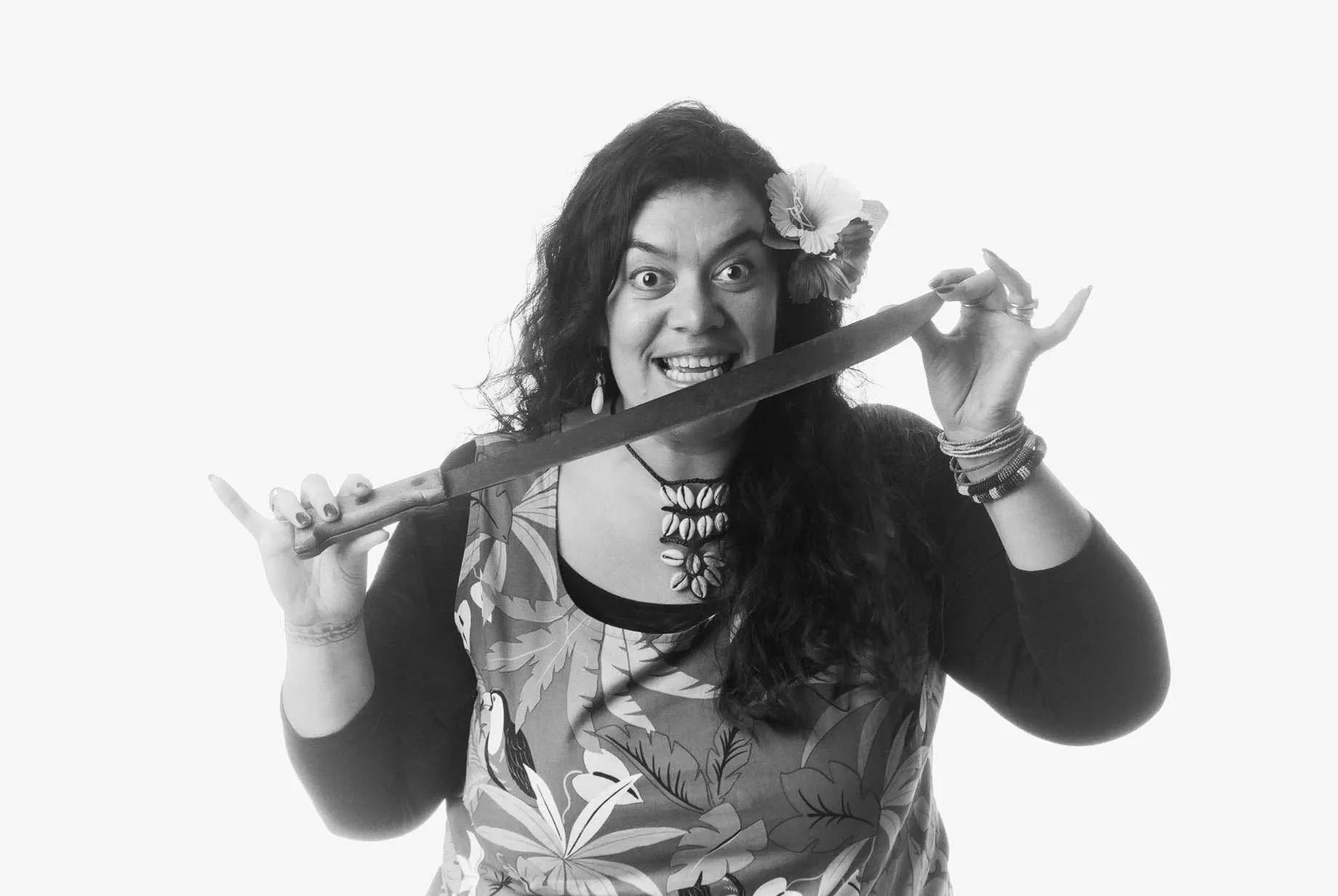Art's Last Supper? Funding Cut's Cruelest Blow

Jesus was 33 when he was crucified - the same age as New Zealand’s first Fringe Festival, established at BATS Theatre in Wellington back in 1990.
Ever heard of the Flight of The Conchords and Taika Waititi? Jemaine Clement and Bret McKenzie formed FoTC in 1998 and owe the trajectory of their brilliant careers to the New Zealand Fringe Festival.
Their fledgling five-man group - So You’re a Man (pictured shirtless) - included future Oscar winner Waititi and debuted at the aforementioned Capital creative institution, BATS.
McKenzie declares “without the Wellington (New Zealand) Fringe Festival, Flight of the Conchords wouldn't exist.
“It was the first place we performed, the first place we discovered our voice, the first place we found an audience that wasn’t our flatmates. The Wellington Fringe Festival enabled us to start our journey that has lead to full time careers in the arts.
“At the time the Fringe Festival was filled with music, laughter, drama, joy, hope, and dreams. With the benefit of hindsight, I can also see it's the garden bed for New Zealand artists to grow.”
But gardens need the right care and environment to flourish, to survive.
Tragically, many of Aotearoa’s successful theatre makers and legacy arts organisations now face possible death by a thousand cuts in Creative NZ’s latest funding round.
Survived COVID - but not cuts?
CNZ’s 2023-25 batch of three-year Toi Uru Kahikatea clients and the recipients of the Annual Art Grants were announced this month. The 27 eligible applicants of the Annual Arts Grants fund who were unsuccessful also included the New Zealand Fringe Festival, and Dunedin Fringe Festival.
The New Zealand Fringe is gearing up for their 33rd annual festival, having been able to continue to offer their festival despite 2022 being under COVID Red light restrictions.
As CNZ Chief Executive Stephen Wainwright pointed out in The Big Idea last week “everyone in real life is involved in contests… We all know when we’re involved in those things, there’s a range of outcomes - not always the ones that we want - and that’s hard to take, for sure.”
Try telling that to the theatre makers, foundation organisations, and the thousands of arts practitioners and their audiences.
The cuts will hit our emerging, young, and most culturally diverse artists and audiences the hardest.
Each year, over 250 Fringe festivals with comedy, circus, cabaret, music, theatre, dance, visual arts, spoken word and more take place all over the globe - including in Wellington, Dunedin and Auckland. Edinburgh Festival Fringe has risen to become the biggest arts festival in the world, celebrating its 75th year in 2023.
Aotearoa’s Fringe Directors say being part of a worldwide Fringe community means fighting for accessibility, celebrating otherness, and ensuring festivals are inclusive and sustainable for every person who wants to participate. As an open-access festival, the Fringe is a foundation for any emerging artist to launch their careers.
Like kauri trees, these NGOs are responsible for creating a healthy arts ecosystem under which thousands of our youngest, most diverse emerging arts practitioners have thrived.
Just take a look at the stats for Wellington’s New Zealand Fringe Festival this year; 183 events registered, 28 digital shows, 534 artists, 42 venues, 534 showings scheduled, 9308 tickets sold, $180,000 directly to artists, 69 events with sold out seasons and 19% of artists registered identifies as Māori/Pasifika.

Tusiata Avia's international hit Wild Dogs Under My Skirt premiered as a solo show in the 2002 Dunedin Fringe.
“Ōtepoti is already reeling and this might be a knockout,” explains Dunedin Fringe Director Gareth McMillan, following last Friday’s announcement that declined funding for their Fringe, the NZ Young Writers Festival, and the Amped Music Project.
“Even if we go ahead next year, the 1000+ arts practitioners who participate in the Dunedin Fringe have just lost critical targeted support.” says Director Gareth McMillan.
New Zealand Fringe Director Vanessa Staceys adds “this places us in a very difficult position with only one hotly contested project funding round left before our programme goes to print.
“We already have record registrations and hundreds of artists that depend on us to provide a platform for their work."
The funds that New Zealand Fringe applied for from Creative New Zealand are channeled directly into the pockets of artists through the Kākano Fund, a $50,000 support fund for artists to present their work, artist capability workshops, and to provide affordable venues and front of house support.
These are arts festival organisations with a significant track record of supporting and championing the emerging artists that feed the arts ecosystem.
In a report on this year's COVID affected Fringe, comments from artists about the importance of Fringe Artists Grants, and workshops also reflected the critical need. None of which can be offered for the 2023 Fringe - if the festival even decides to go ahead.
The Government’s COVID-19 Resurgence Response Fund helped arts practitioners across Aotearoa to put food on their tables.
I know, I was one of these artists.
However, feeding all of us in the short-term may have created a long-term funding deficit for the arts.
Auckland Fringe had its dynamic season on 30 August until 17 September, with an inclusive 70 shows that pushed the many creative boundaries in Tāmaki Makaurau.
Borni Te Rongopai Tukiwaho, the Director of Auckland Fringe is devastated.
"We're all still reeling from the impacts of delivering festivals in a COVID world. The short-sightedness of declining support across the network has been huge and the negative effects on Tāmaki Fringe Festival have been visceral.
“We are constantly having to prove our worth - when it is clear the benefits our festivals bring to the creative and wider community. This year alone, it has affected our operational and financial capabilities, and capacity. The lack of support puts into question how we can continue our mahi supporting grassroots - emerging, experimental, and established creatives - when we are stretched so thin, undervalued, and pushed to the edge of our own mental health limits.
“It's just not good enough..."
"We will not take this lying down"
A total of 27 - more than half the 50 eligible applicants for the Annual Arts Grants also missed out - compared with only seven rejections the previous year. Shockingly, six highly successful independent theatre makers have lost funding too.
“It’s brutal,” reiterates Louise Gallagher, CEO of Performing Arts Network New Zealand (PANNZ),
“The impact of the loss of funding to the mid-career independent, professional theatre makers is absolute devastation to the industry. We are rallying as an industry and will not take this lying down.
“The following list is a cohort of theatre makers, who have been making high quality work for New Zealanders, who have built their businesses with solid business plans, policies and programmes over a sustained period of years, and were ALL provided the feedback that their programmes be “recommended for funding” by the assessors.
“Creative NZ have advised they were not funded, not because their work was not good enough or they were not valued, but simply because there is not enough money to go around.
- Nightsong
- A Slightly Isolated Dog
- Binge Culture
- Karin McCrackin and Eleanor Bishop (whose play Yes, Yes, Yes - without the annual arts funding - cannot deliver the planned 5 centre Australian tour, nor the national tour which also included a tour to schools.)
More pain to come
Gallagher continues. “It is now, more than ever, a critical time to ensure these makers receive the funding they need to survive. After 2 years of these artists continuing to make programmes, provide work, and keep going through COVID, it seems particularly damaging to the sector at this time to not allow work out to tour/be programmed in 2023 - just as the industry is coming back to life.
“We were careful to galvanise the industry and not pit anyone against each other, including CNZ – as they have a really tough role to play. The fact is that it is The Ministry for Culture and Heritage (MCH)/Central Government who have provided no more funding or increase in any way to CNZ. We want to know, why not?
“This is just the first cut, there are more to come, as the arts grant rounds come up shortly - there is going to be more and more independent artists who are not funded.
“I was worried what would happen to the sector when COVID came, but this is much, much more concerning.
“Everyone should be very worried about what is going to happen to the performing arts in this country, and what is going to happen to us creatively as a nation.”
If art is about healthy ecosystems, about hauora – the Māori term for wellness of life - without our vital theatre makers, the Fringe Festivals and their accessible platforms, what will happen to our arts ecosystem?
Could this be the season of last supper for Arts in Aotearoa?
Written by Lynda Chanwai-Earle - Playwright/ 2019 IIML Writer in Residence, Victoria University, Wellington/ Producer of Sustainable Theatre, Aotearoa.
